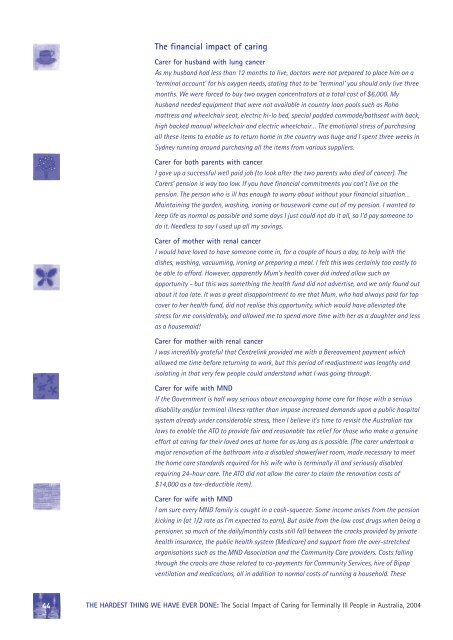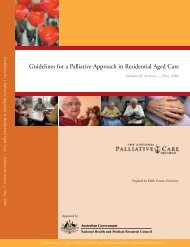The hardest thing we have ever done - Palliative Care Australia
The hardest thing we have ever done - Palliative Care Australia
The hardest thing we have ever done - Palliative Care Australia
Create successful ePaper yourself
Turn your PDF publications into a flip-book with our unique Google optimized e-Paper software.
<strong>The</strong> financial impact of caring<br />
<strong>Care</strong>r for husband with lung cancer<br />
As my husband had less than 12 months to live, doctors <strong>we</strong>re not prepared to place him on a<br />
‘terminal account’ for his oxygen needs, stating that to be ‘terminal’ you should only live three<br />
months. We <strong>we</strong>re forced to buy two oxygen concentrators at a total cost of $6,000. My<br />
husband needed equipment that <strong>we</strong>re not available in country loan pools such as Roho<br />
mattress and wheelchair seat, electric hi-lo bed, special padded commode/bathseat with back,<br />
high backed manual wheelchair and electric wheelchair… <strong>The</strong> emotional stress of purchasing<br />
all these items to enable us to return home in the country was huge and I spent three <strong>we</strong>eks in<br />
Sydney running around purchasing all the items from various suppliers.<br />
<strong>Care</strong>r for both parents with cancer<br />
I gave up a successful <strong>we</strong>ll paid job (to look after the two parents who died of cancer). <strong>The</strong><br />
<strong>Care</strong>rs’ pension is way too low. If you <strong>have</strong> financial commitments you can’t live on the<br />
pension. <strong>The</strong> person who is ill has enough to worry about without your financial situation…<br />
Maintaining the garden, washing, ironing or housework came out of my pension. I wanted to<br />
keep life as normal as possible and some days I just could not do it all, so I’d pay someone to<br />
do it. Needless to say I used up all my savings.<br />
<strong>Care</strong>r of mother with renal cancer<br />
I would <strong>have</strong> loved to <strong>have</strong> someone come in, for a couple of hours a day, to help with the<br />
dishes, washing, vacuuming, ironing or preparing a meal. I felt this was certainly too costly to<br />
be able to afford. Ho<strong>we</strong>ver, apparently Mum’s health cover did indeed allow such an<br />
opportunity - but this was some<strong>thing</strong> the health fund did not advertise, and <strong>we</strong> only found out<br />
about it too late. It was a great disappointment to me that Mum, who had always paid for top<br />
cover to her health fund, did not realise this opportunity, which would <strong>have</strong> alleviated the<br />
stress for me considerably, and allo<strong>we</strong>d me to spend more time with her as a daughter and less<br />
as a housemaid!<br />
<strong>Care</strong>r for mother with renal cancer<br />
I was incredibly grateful that Centrelink provided me with a Bereavement payment which<br />
allo<strong>we</strong>d me time before returning to work, but this period of readjustment was lengthy and<br />
isolating in that very few people could understand what I was going through.<br />
<strong>Care</strong>r for wife with MND<br />
If the Government is half way serious about encouraging home care for those with a serious<br />
disability and/or terminal illness rather than impose increased demands upon a public hospital<br />
system already under considerable stress, then I believe it’s time to revisit the <strong>Australia</strong>n tax<br />
laws to enable the ATO to provide fair and reasonable tax relief for those who make a genuine<br />
effort at caring for their loved ones at home for as long as is possible. (<strong>The</strong> carer undertook a<br />
major renovation of the bathroom into a disabled sho<strong>we</strong>r/<strong>we</strong>t room, made necessary to meet<br />
the home care standards required for his wife who is terminally ill and seriously disabled<br />
requiring 24-hour care. <strong>The</strong> ATO did not allow the carer to claim the renovation costs of<br />
$14,000 as a tax-deductible item).<br />
<strong>Care</strong>r for wife with MND<br />
I am sure <strong>ever</strong>y MND family is caught in a cash-squeeze. Some income arises from the pension<br />
kicking in (at 1/2 rate as I’m expected to earn). But aside from the low cost drugs when being a<br />
pensioner, so much of the daily/monthly costs still fall bet<strong>we</strong>en the cracks provided by private<br />
health insurance, the public health system (Medicare) and support from the over-stretched<br />
organisations such as the MND Association and the Community <strong>Care</strong> providers. Costs falling<br />
through the cracks are those related to co-payments for Community Services, hire of Bipap<br />
ventilation and medications, all in addition to normal costs of running a household. <strong>The</strong>se<br />
44 THE HARDEST THING WE HAVE EVER DONE: <strong>The</strong> Social Impact of Caring for Terminally Ill People in <strong>Australia</strong>, 2004
















